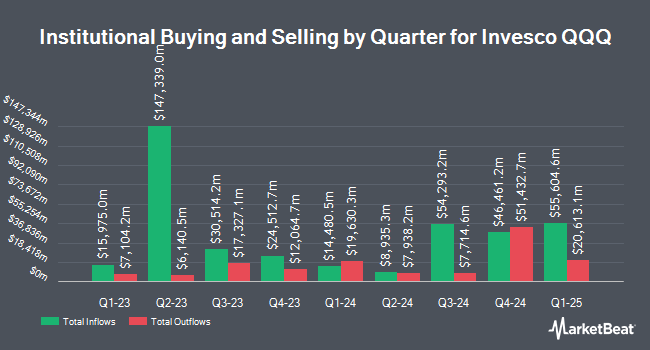Retirement Planning Group LLC cut its stake in Invesco QQQ (NASDAQ:QQQ - Free Report) by 11.3% in the 4th quarter, according to its most recent 13F filing with the Securities and Exchange Commission (SEC). The institutional investor owned 38,504 shares of the exchange traded fund's stock after selling 4,912 shares during the period. Invesco QQQ makes up about 1.0% of Retirement Planning Group LLC's portfolio, making the stock its 21st biggest holding. Retirement Planning Group LLC's holdings in Invesco QQQ were worth $19,685,000 as of its most recent filing with the Securities and Exchange Commission (SEC).
A number of other institutional investors have also recently modified their holdings of QQQ. Proficio Capital Partners LLC boosted its stake in Invesco QQQ by 51,292.3% in the fourth quarter. Proficio Capital Partners LLC now owns 11,500,566 shares of the exchange traded fund's stock valued at $5,879,434,000 after buying an additional 11,478,188 shares in the last quarter. Strategic Financial Concepts LLC boosted its stake in Invesco QQQ by 47,853.9% in the fourth quarter. Strategic Financial Concepts LLC now owns 4,113,968 shares of the exchange traded fund's stock valued at $2,103,184,000 after buying an additional 4,105,389 shares in the last quarter. NWI Management LP boosted its stake in Invesco QQQ by 121.6% in the fourth quarter. NWI Management LP now owns 648,000 shares of the exchange traded fund's stock valued at $331,277,000 after buying an additional 3,648,000 shares in the last quarter. Senator Investment Group LP acquired a new stake in Invesco QQQ in the fourth quarter valued at about $679,936,000. Finally, Artemis Wealth Advisors LLC boosted its stake in Invesco QQQ by 1,337.4% in the fourth quarter. Artemis Wealth Advisors LLC now owns 828,335 shares of the exchange traded fund's stock valued at $423,470,000 after buying an additional 895,277 shares in the last quarter. 44.58% of the stock is currently owned by institutional investors.
Invesco QQQ Price Performance
NASDAQ:QQQ traded down $4.76 during trading hours on Friday, hitting $509.24. The company's stock had a trading volume of 58,324,904 shares, compared to its average volume of 37,363,809. The stock has a fifty day simple moving average of $474.84 and a 200-day simple moving average of $500.89. The company has a market capitalization of $319.12 billion, a P/E ratio of 30.62 and a beta of 1.11. Invesco QQQ has a twelve month low of $402.39 and a twelve month high of $540.81.
Invesco QQQ Cuts Dividend
The firm also recently disclosed a dividend, which was paid on Wednesday, April 30th. Investors of record on Monday, March 24th were paid a $0.7157 dividend. The ex-dividend date was Monday, March 24th.
About Invesco QQQ
(
Free Report)
PowerShares QQQ Trust, Series 1 is a unit investment trust that issues securities called Nasdaq-100 Index Tracking Stock. The Trust's investment objective is to provide investment results that generally correspond to the price and yield performance of the Nasdaq-100 Index. The Trust provides investors with the opportunity to purchase units of beneficial interest in the Trust representing proportionate undivided interests in the portfolio of securities held by the Trust, which consists of substantially all of the securities, in substantially the same weighting, as the component securities of the Nasdaq-100 Index.
Featured Stories

Before you consider Invesco QQQ, you'll want to hear this.
MarketBeat keeps track of Wall Street's top-rated and best performing research analysts and the stocks they recommend to their clients on a daily basis. MarketBeat has identified the five stocks that top analysts are quietly whispering to their clients to buy now before the broader market catches on... and Invesco QQQ wasn't on the list.
While Invesco QQQ currently has a Hold rating among analysts, top-rated analysts believe these five stocks are better buys.
View The Five Stocks Here
Discover the 10 Best High-Yield Dividend Stocks for 2025 and secure reliable income in uncertain markets. Download the report now to identify top dividend payers and avoid common yield traps.
Get This Free Report
Like this article? Share it with a colleague.
Link copied to clipboard.